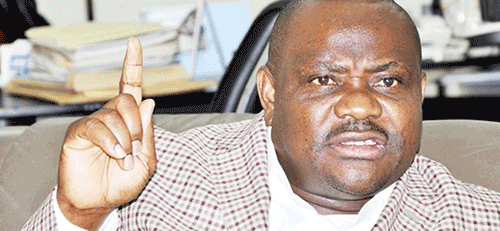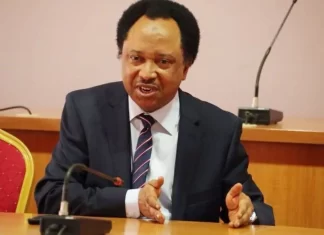Assistant Editor (South South), JOE EZUMA, writes on factors and personalities that influenced the March 28 Presidential and National Assembly elections in Rivers State.
With apparent adoption of the report of the investigative committee set up by the Independent National Electoral Commission (INEC) into the conduct of the Saturday, March 28 Presidential and National Assembly polls in Rivers State, it is clear that the Peoples Democratic Party (PDP) carried the day in the state.
In the result posted by INEC, the PDP scored 1.4 million votes while the All Progressives Congress (APC) had 63,000 votes. Though many agreed with the outcome as regards the presidential election, sweeping of all the senatorial and House of Representatives slots in the state by the PDP was seen as one of the many paradoxes of the 2015 election, particularly in Rivers.
According to the result, Senator Magnus Abe of the APC was ousted by PDP’s Olaka Nwogu for Rivers East senatorial district. Senator George Sekibo retained his seat against his challenger, Andrew Uchendu, while Osinakachukwu Ideozu beat Otelemaba Amachree, current Speaker of Rivers House of Assembly (APC), for Rivers West.
Those for House of Representatives are: Betty Apiafi (Abua/Odual/Ahoada East) Uche Obi (Ahoada West/Ogba/Egbema/Ndoni), Jacobson Nbina (Tai/Eleme/Oyigbo), Kingsley Chinda (Obio/Akpor), Awaji Abiante (Andoni/Opobo/Nkoro), and Randolph Brown (Bonny/Degema).
Others are Boma Goodhead (Akuku-Toru/Asari-Toru), Kenneth Chikere (Port Harcourt I), Blessing Nsiegbe (Port Harcourt II), Dumnamene Dekor (Khana/Gokana), Emerengwa Sunday (Ikwerre/Emohua), Jerome Eke (Etche/Omuma) and Gogo Tamuno (Okrika/Ogu-Bolo) – all of PDP.
The shocking outing came despite Governor Rotimi Amaechi’s acclaimed good showing in infrastructure development of the state as well as APC’s aggressive and spirited political campaign towards the election.
Many factors are said to be responsible for the poor outing by APC, among which is the Ijaw factor that had been in the vanguard for return of power to the riverine section of the state.
The Ijaw constitute the riverine culture of Kalabari, Okrika Igbani (Bonny) and other tiny riverine cultures that make the Ijaw culture in Rivers. Their fringe neighbours are the Opobo, Nkoro, Andoni and others, while the Opobo are predominantly Igbo-speaking. All, however, had aggregated to agitate for return of political power to the riverine, particularly the Kalabari Ijaw just before the controversial governorship primaries of the PDP. The APC, which appeared to hold out hope for them, later left them in the lurch, by going for Dakuku Peterside from a fringe riverine area of Ndoni/Opobo.
The choice of Dakuku, it was gathered, did not go down well with them, as they saw it as huge betrayal.
PDP chairman in Degema Local Government Area, Tonye Tiger, encapsulated the groups’ outburst while recounting what he termed the many lies of Amaechi to the Kalabari, just to win their support in his war of attrition against President Goodluck Jonathan. According to him, some of his kinsmen had hoped and believed Amaechi’s allegations against Jonathan, especially that he had natural hatred for them and was bent on taking their oil wells in Soku to his Bayelsa home state.
It was against the backdrop of this animosity that the groups were said to have voted against APC candidates.
Another factor that aided PDP and President Jonathan in the Rivers election was the residual anger of the Ogoni who equally laid claim to the Rivers governorship slot. Thus, when Abe was dropped in favour of Peterside by the APC, the people saw it as a slight. While Abe stressed that the sensibility of the Ogoni was injured, the Deputy Speaker of the House of Assembly, Leyii Kwanee, an Ogoni, emphasised that the Ogoni would not play second fiddle in the emerging dispensation.
Although there was some rapprochement that appeared to have calmed some frayed nerves, the people appeared to have carried their anger to the Presidential/National Assembly election and may still continue so as Abe has finally lost out to PDP’s Nwogu.
Added to the above is that with the creation of Bayelsa from Rivers in 1996, the riverine, which used to be dominant political group, has shrunk to tiny minority in the state, a situation that was further exacerbated by the splitting of the Kalabari ethnic group into two with one side merged with some upland communities to form Rivers West senatorial district. Another big factor that counted for PDP’s victory in Rivers was that nearly all peoples of the South South and South East appear to have resolved at that election to vote for Jonathan.
The Wike factor
In addition, when Amaechi left PDP with his loyalists to the APC, little did they know that Nyesome Wike had the courage, the cash and political savvy to repackage and mobilise the party with the instrumentality of the political pressure group, Grassroots Democratic Initiative. With this drive, the PDP, which was made an instant minority party in the state, regained its voice. So it was able to penetrate deep into the grassroots before the APC began to challenge it, effectively.
Enter the boycott, election day crises
Boycott of election in any guise had never benefitted the boycotting party in Nigeria’s history. It was against this background that the reported directive by the APC to its members to boycott the poll was seen as providing the avenue for PDP to have a field day.
This was in addition to the allegations by APC that its members were disenfranchised by INEC officials in league with security agents and PDP chieftains. Amaechi had specifically accused INEC of not coming with election result sheets to polling stations, arguing that it was a ploy for PDP rigging.
APC chairman in the state, Davies Ikanya, in his reaction condemned what he called “brazen rape of democracy by PDP in collaboration with INEC and the security agents”, describing the action as an opposite of what democracy should be. He passed a vote of no confidence on the state’s Resident Electoral Commissioner (REC), Gesila Khan, accusing her of being in agreement with PDP to return victory to the party at all costs.
In its reaction three days later, PDP chided Amaechi for getting to the polling unit and refusing to be accredited, adding: “Subsequent directive by Amaechi to his APC members to demand for the result sheets all over the state was aimed purely at disrupting an election which he knew he would lose.”
The party, in a statement, insisted that Amaechi “just played to the gallery to masquerade his disgrace”, adding, however, that the electorate ignored him and went ahead to massively exercise their franchise.














